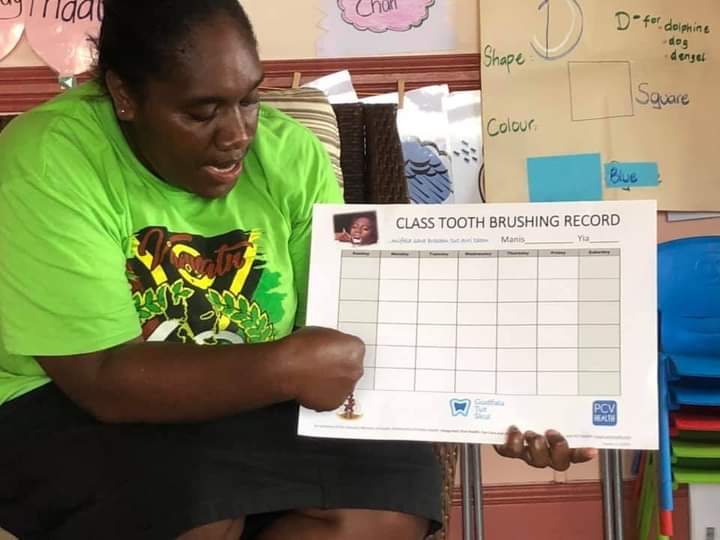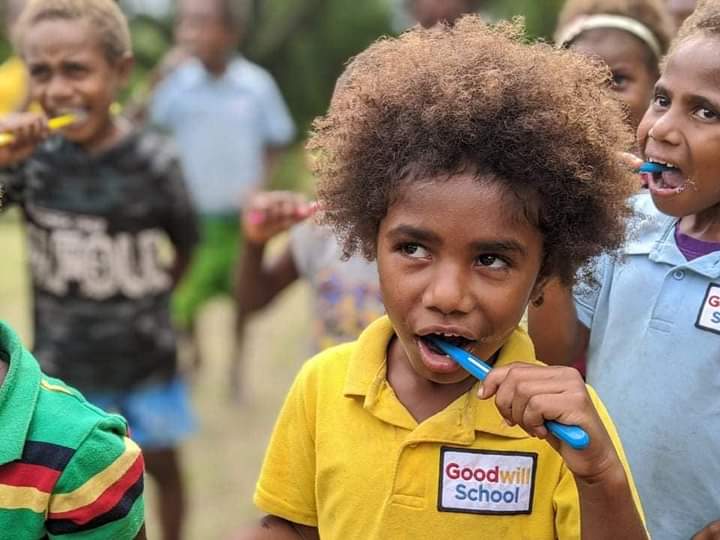A line of children forms outside the classrooms at Central School in Port Vila, Vanuatu. One by one, each student approaches their teacher and stands still while she places a drop of liquid on their tongue. After a few minutes, giggles can be heard across the courtyard.
A quick wipe of the tongue across each student’s teeth has turned them pink, blue or purple. Blue or purple indicate a student has not brushed their teeth for a week or more and show older plaque build-up, while pink indicates teeth have not been brushed in the past 24-hours. The students are then handed a mirror, shown where they have plaque on their teeth and taught to properly brush their teeth for 2 minutes by their teacher or a local public health educator.
The “liquid” or plaque disclosing gel is one of the steps in Vanuatu’s school-based toothbrushing programme “Gudfala Tut Skul” or “Healthy Tooth School”, designed to teach children aged 5–7 years to regularly brush their teeth and develop lifelong healthy habits.
“Little ones, especially children in kinders and primary school, are easier to change behaviours and more likely to take up the information on proper brushing and good nutrition,” says Dr Jenny Stephens, Acting Director, Department of Public Health, Ministry of Health. Dr Stephens has been managing the programme since its inception.
Gudfala Tut Skul provides kindergartens and primary schools toothbrushing kits comprising 2 toothbrushes for each child, storage containers for in the classroom and at home, and fluoride toothpaste. The toothpaste is also locally-produced with coconut oil and calcium carbonate as an income-generating activity by a local women’s association, and stored in reusable containers to reduce waste.
Teachers are then trained to dispense small amounts of toothpaste, supervise brushing and safely store toothbrushes. As an incentive to brushing, each class is given a toothbrushing record chart and stickers so teachers can record students’ daily toothbrushing at school. A record chart is also given to students to take home to their caregivers in order to record toothbrushing at home.

A dental assistant explaining to a class in Santo, Sanma province, Vanuatu how to use a record chart to keep track of toothbrushing at school. Photo courtesy of Vanuatu Ministry of Health.
The programme aims to reduce the high burden of tooth decay and dental caries in children in Vanuatu. According to the 2017 National Oral Health Survey, an estimated 70% of children aged 5–7 years in Vanuatu have tooth decay and bleeding gums, and over 40% of students never or rarely brush their teeth.
“In rural areas especially, many children have oral health problems or other health challenges, but won’t tell their parents or teachers about it,” says Dr Stephens. “But later we come to realize they have a toothache or problems with their eyesight or hearing when they perform poorly at school. This programme aims to prevent these problems before they start and help kids build healthier lifestyles.”
Since major oral diseases, dental caries and periodontal diseases are largely preventable with good oral hygiene, the Government of Vanuatu developed a National Oral Health Policy and Gudfala Tut Skul programme in 2019 to strengthen oral health promotion in schools, increase access to affordable fluoride toothpaste and emphasize good nutrition, among other aims.

A student participates in supervised toothbrushing in a school in Tanna, Tafea province, Vanuatu. Photo courtesy of Vanuatu Ministry of Health.
The programme was first introduced and piloted in Port Villa – Vanuatu’s largest urban centre – where dental caries experience is more than twice that of people living in rural areas. After a 20-week trial period in grades 1, 6 and 9, students had reduced their mean plaque scores and oral habits among their family members had also improved.
Beyond brushing well for 2 minutes with fluoride toothpaste, the programme also emphasizes good nutrition by teaching children to eat well and drink well. Eating well means making healthy food choices and limiting free sugars intake, such as from candy and biscuits. Drinking well focuses on increasing children’s intake of water and limiting sugar-sweetened beverages to maintain good hydration and salivary flow.
Children who attend kindergarten and school in Vanuatu are offered healthy snacks and drinks in order to not only improve oral health but also help prevent obesity and other noncommunicable diseases.
To date, Gudfala Tut Skul has been implemented in 30 kindergarten and primary schools in the archipelago and more than 3000 children have been reached. The programme aims to reach all children aged 5–7 years in the country by 2023. The Integrated Health Unit at the Directorate of Public Health has also started incorporating eye and ear, nose and throat (ENT) screening in the programme, as part of their health promoting schools plan.
Dr Eunyoung Ko, Country Liaison Officer for WHO Vanuatu says, “Healthy Tooth School is part of the concept of healthy promoting schools. It is an investment for the future to reduce the disease burden of people across the life-course by introducing healthy behaviours at an early stage of life.”
